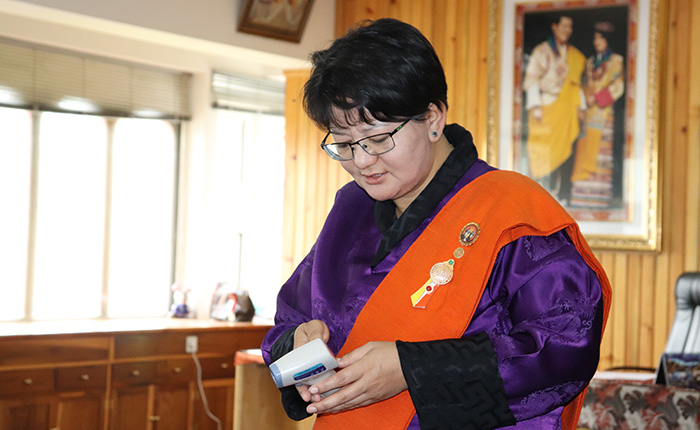Younten Tshedup
With about 300 tests conducted a day, Bhutan has one of the highest Covid-19 testing rates (test per million) in the world today.
Testing, according to health officials, is crucial to understanding the spread of the pandemic and to respond effectively. No country knows the total number of people infected with Covid-19; all that is known today is the infection status of those who have been tested.
Presently, only those who have a lab-confirmed infection are counted as confirmed cases. This means that the counts of confirmed cases depend on how much a country actually tests. Without testing, there is no data.
To further strengthen the government’s testing capacity and to support the overall response to the pandemic, UNICEF Bhutan handed over two polymerase chain reaction (PCR) machines to the health ministry yesterday.
Along with the two machines, 4,800 rapid diagnostic test (RDT) kits, 35,952 items of personal protective equipment (PPE), 100 handheld thermometers and 3,652 water, sanitation and hygiene (WASH) supplies were also handed over.
Officials said that the PCR machines, each of which was procured with funding support from the Asian Development Bank (ADB) and the Government of Japan (GoJ) would supplement the existing PCRs in the country and support the health ministry’s efforts to test more samples taken for Covid-19.
One of the machines is installed at the Royal Centre for Disease Control in Thimphu. The other machine would be sent to Mongar. The machines can test 96 samples at a time.
The PCR tests, considered as the confirmatory tests for Covid-19, provide real-time and accurate data within 35 minutes.
In addition to the 4,800 RDT kits handed over yesterday, officials said that an additional 1,000 kits procured with support from ADB are expected to arrive next month.
As of yesterday, the health ministry has conducted 14,928 rapid diagnostic tests and 7,594 PCR tests.
The PPE supplies comprise of coverall, face shields and masks, alcohol-based hand rub, and thermometers for frontline and facility health care workers. It also includes WASH supplies for infection prevention that are critical in the government’s efforts to respond to Covid-19.
Health Minister Dechen Wangmo said that the much-needed support from development partners in such times is a genuine sign of solidarity.
“The support will greatly help the health ministry in scaling up its testing capacity and enhancing its preparedness to efficiently counter possible community transmission of the virus.”
UNICEF Bhutan Representative Dr Will Parks said, “These critical supplies will allow our courageous health workers in the frontline and in health care facilities to safely respond to the pandemic. Health workers need and deserve protection and by keeping them safe, we are also protecting children, families and entire communities.”
ADB Country Director Kanokpan Lao-Araya said, “These medical supplies are procured from ADB’s initial assistance to support the government of Bhutan’s efforts to monitor and contain the Covid-19 pandemic, provide effective treatments, and protect healthcare workers.”
She said that in addition to this, the ADB has provided additional assistance in collaboration with other development partners, including an additional grant for procuring medical supplies and countercyclical support to meet the needs of people most affected at this challenging time.
Officials said that UNICEF procured medical supplies and equipment with support from the GoJ and ADB. Globally, UNICEF’s expertise is leveraged to support governments to procure essential and emergency medical supplies.


